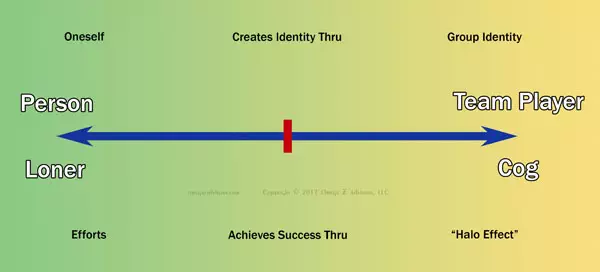How Different People React to Teams in the Workplace
Businesses need teams to grow. There are many different teams though. There are also many ways to have teams work. How different people react to teams in the workplace affects these choices.
Three main problems make this difficult to understand though:
- People are often more different than others think they are.
- Dissenting attitudes towards teams are hard to accept.
- Teams are overly glorified.
As a result, people tend to see those who are less enamored with teams as bad eggs, loners. So, they get tossed. In the long run though, this costs talent, adaptability and money.
Positive and Negative Reactions to Teams in the Workplace

Reactions to teams in the workplace are based largely on how one seeks to create his identity and to achieve success.
As I showed in my post about the different reactions employees have to structure, the bell curve helps us here again. It reminds us that a wide array of reactions are possible for anything. That includes teams. This means that about a third of the people will have extreme reactions to teams, positive or negative.
Those who react well to just about any team like it the identity it gives them. It allows them to feel part of something bigger. If the team wins, they win. More importantly, if the team is a winner, they are winners.
Moreover, there is the halo effect. Not only do they feel like winners but others see them as winners too even though their role was minor.
On the other end are those who don’t care much for teams. Their talents and skills define them, not any team. On teams, they are no longer a person, they are just a “cog” in the team machine.
Even if the team does well, they’ll often feel guilty about taking any credit especially if they feel their role was small. Thus, they often see their work on teams as a form of altruism. They are sacrificing for the team.
The Challenge of Teams in the Workplace
Typically, to resolve these differences, companies toss those who aren’t “team players.” They rely on the excessive glorification of teams to get people to buy in them. “What!? You don’t like teams? You’re not a team player then. Be a loner then!”
Yet, they don’t really define the team. It’s just a group to them. The problem is that many like teams. That is until they see they’re on a team slaves.
Make no mistake though. Some will like this. They’re just happy to belong anywhere . . . even if it’s on such a team.
That’s why the easiest thing to do is to find those who are just happy to be on any team. It avoids the hassles of managing a dynamic team.


